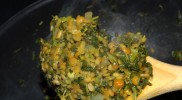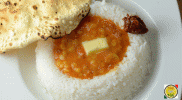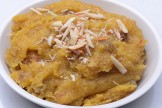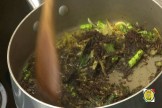
Amaranth toor dal is a dry kind of curry variety which is very healthy. ...

Tomato Pappu recipe or tomato dal made in Andhra style is delicious as garlic is used....
Three mixed dal vada is a black eyed beans, horse gram and kidney beans. This is a snack ...

Channa Dal Sooji Halwa is a most seen delicacy on religious occasions in India....
Lightly spiced moong dal and ridge gourd combination is a dal recipe for roti or pulka. M...

Tender tamarind leaves dal or chinta chiguru pappu is a common dish from the Andhra cuisi...
Sambar is a dish in South Indian and Sri Lankan Tamil cuisines, made of toor dal and veggies, sambar masala. A variant of sambar called pappu chaaru is more common in Andhra Pradesh.
Sambhar recipe or Sambar or Kuzhambu is the dish that is common in South India and Sri Lanka. One of the popular signature dishes in the Tamilian cuisine. This dish is usually made every day in most of the Tamilian household. It is also... Read More..
About Recipe
Pappu charu koora, Samayalkurippu Kuzhambu, Shukto torkari |
|||||||||||||||||||||||||||||||||||||||||||||||||||||||||||||||
|
|||||||||||||||||||||||||||||||||||||||||||||||||||||||||||||||
Sambhar recipe or Sambar or Kuzhambu is the dish that is common in South India and Sri Lanka. One of the popular signature dishes in the Tamilian cuisine. This dish is usually made every day in most of the Tamilian household. It is also prepared in Karnataka and Kerala.
A variant of sambar known as Pappuchaaru is more common in Andhra Pradesh. A dish made of Tur dal or Tuvar dal (pigeon pea) cooked in pressure cooker. Tamarind soaked in water to extract the juice combined with mixed vegetables (including lady's finger, drumstick, carrot, radish, pumpkin, potatoes, tomatoes, brinjal and whole or halved onions and also other vegetables), spices (turmeric and chilli powder) and freshly ground sambar powder cooked together adding the dal and boiling the sambar well till it gives anthumping aroma all over the house.
The cooked sambar is eaten with an tempered spice mixture containing ingredients likemustard seeds, urad dal, dried red chillies, curry leaves, fenugreek seeds, coriander seeds and asafetida. . Fresh curry leaves and coriander leaves are added at the very end to enhance the aroma of the sambhar.
The longer the sambar is cooked the better the taste and flavors. South Indian food, people and culture are inextricably linked to a ubiquitous dish as in idli and sambhar, sambhar and rice and so on. Each state in the South prepares it with a typical variation, adapted to its taste and environment.
Sambar is reflective of a broad and ancient tradition of dal-based vegetable stews in southern India. Many regions and families of the Indian subcontinent have developed and maintained their own adaptations of a dal and vegetable stew, and similar preparations are evident in such dishes known in local languages as rasam, charu, saaru, and pappu chaaru. Toor dal or Tuvar dal or Tur dal or Arhar dal (yellow dal) is a whole lentil, yellow in color with a tan jacket but are usually skinned and split.
They are mild and have a nutty flavor. Tur Dal is a very vital ingredient in preparing dal for a daily meal like Plain dal, Sambar and also used in preparation of Rasam. Dal is one of my most vital elements that I love eating with hot rice. Dal can also be spelled in many ways like the “Dahl”, “Daal”, “Dhal”, or the “Parippu”, “Paruppu” and “Pappu” because of the wide cultural heritage and multifaceted languages that we have in our Country. Dal is a preparation of pulses (dried lentils, peas or beans) which have been stripped of their outer hulls and split.
Dals are also commonly available like the whole pulses known as sabut dal or the split dal known as dhuli dal. The hulling of a pulse is to improve digestibility and palatability. There are over 50 different varieties of pulses in India & Pakistan. Dal is prepared like a thick stew with mild spices and seasoned with fresh curry leaves (also called Karipak) and coriander leaves (known as cilantro) to give an earthy flavor. Dal (dried lentil) is low in fat and high in protein, fibre and nutritious.
Healthy veggies (drumsticks, eggplant, bottle gourd, carrot) added to this sambar enhances its taste.
Below listed are some of my favourite Sambar/ Sambhar recipes that I love to eat and is also almost cooked at every household in south India:
Chow chow Sambar Chow chow sambar is a traditional sambar preparation popular in and around the districts of Tamil Nadu. Sambar is generally prepared at every home with any vegetable, lentils and spices cooked together in a tangy soup. In this recipe, chow chow or chayote is added and cooked with lentil to make an excellent dish. The dish is creamy, smooth and a brilliant combination of all flavours.

Guest Posted on Fri Aug 12 2016
I had tried it for the first time. Believe me it indeed was fantastic. I am nil at cooking yet I tried it and it worked. Will try out your other recipes. MS Francis, pune.
Reply 0 - Replies
Guest Posted on Fri Aug 12 2016
I had tried it for the first time. Believe me it indeed was fantastic. I am nil at cooking yet I tried it and it worked. Will try out your other recipes. MS Francis, pune.
Reply 0 - Replies
Radha Sai Posted on Sat Oct 03 2015
Sairam. I really enjoy watching your programmes as you are good at presenting the preparation of the receipes in a very wonderful manner. Thank You, Sir.?
Reply 0 - Replies
qalaanjofy Posted on Sun Oct 04 2015
@Van chef Thank you so much I tried this recipe for my vegetarian friends it was a great hit. The only thing I did different was I couldn't find jagg powder but I doubled the coconut milk and added mango powder instead.?
Reply 0 - Replies
blood hound Posted on Thu Oct 08 2015
i love andhra style sambher more than karnataka and tamil nadu...its coz its bit of more spicy and sweet too?
Reply 0 - Replies
srikanth s Posted on Fri Oct 23 2015
Sambar with spice in tamilnadu???????? I am wondering...Almost sambar in tamilnadu and karnataka are almost same..?
Reply 0 - Replies




 Easy recipes
Easy recipes
 Healthy Recipes
Healthy Recipes
 Dessert Recipes
Dessert Recipes
 Mutton and Lamb
Mutton and Lamb  Indian Bread Recipes
Indian Bread Recipes
 Dal Recipes
Dal Recipes
 Chutney and Pickles
Chutney and Pickles  Indo-Chinese Recipes
Indo-Chinese Recipes
 Snacks and Appetizers
Snacks and Appetizers
 Low Fat Recipes
Low Fat Recipes
 Chaat Recipes
Chaat Recipes
 Biryani and Rice
Biryani and Rice  Curry Recipes
Curry Recipes
 Indian Sweet Recipes
Indian Sweet Recipes
 Egg Recipes
Egg Recipes
 Paneer Recipes
Paneer Recipes
 Chicken Recipes
Chicken Recipes
 Indian tiffins
Indian tiffins
 Egg less Recipes
Egg less Recipes
 Soups and Salads
Soups and Salads
 Indian Sea Food
Indian Sea Food
 Manchurian Recipes
Manchurian Recipes
 Indian Drinks Recipes
Indian Drinks Recipes
 Dinner Recipes
Dinner Recipes
Ashwini Biradar Posted on Sat Sep 30 2017
I tried this sambar recipe ,it was tasty .thanks for giving such good recipe.
Reply 0 - Replies